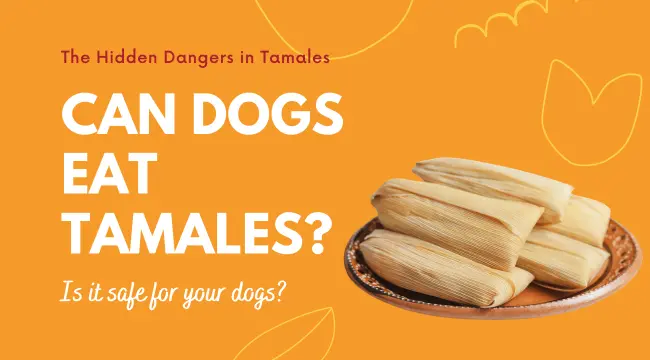Can Dogs Eat Tamales?What Experts Say in 2024

Can Dogs Eat Tamales? Have you ever found yourself savoring a plate of delicious tamales, only to be met with those irresistible puppy-dog eyes, begging for a taste? The question of whether dogs can eat tamales is more than just a passing thought; it’s a concern many pet parents have. In this intriguing discussion, we’re going to unravel the mysteries surrounding tamales and our furry companions. Can dogs eat tamales as a delectable treat, or should they stay far away from this traditional Mexican delight? Join us as we explore the do’s and don’ts of sharing tamales with your canine friend, ensuring their well-being remains a top priority.
The Hidden Dangers in Tamales: Why They’re Not Safe for Your Dog
Can Dogs Eat Tamales? Tamales, a staple in many households and restaurants, have a rich and diverse history of ingredients. While they can be a mouthwatering delight for humans, they pose a host of concerns when it comes to our furry companions. The reasons why tamales are not great for dogs are multifaceted, and it’s essential to understand the potential dangers lurking within these tempting morsels.
- Onion and Garlic: Traditionally made tamales often contain onions and garlic, both of which are toxic to dogs. Onions contain a compound known as N-Propyl Disulphide, which triggers the breakdown of red blood cells through a process called hemolysis. This occurs because a dog’s immune system identifies the affected cells as invaders, leading to a cascade of health issues. Whether they’re raw, cooked, or powdered, all forms of onions are perilous for our canine companions.
- Garlic: Garlic, a close relative of onions, poses the same risks of hemolytic anemia, but even in smaller quantities. In fact, it can take as little as 15 to 30 grams of garlic to have serious or fatal effects on a dog, with certain breeds being more sensitive than others. Japanese breeds, in particular, are at higher risk, even when the amount of garlic consumed is below the toxic threshold.
- Garlic or Onion Powder: Tamales often include garlic or onion powder, which are highly concentrated versions of these vegetables. Even a small amount can push a dog over the toxic limit, making them particularly dangerous.
- Corn/Plantain Husk: The husks that tamales are traditionally served in are hazardous for dogs. Not only are they tough and can lead to choking, but if a dog manages to swallow one, it can result in an intestinal blockage that requires immediate surgical intervention.
- Salt and Fat: The masa dough in tamales can contain excessive salt, which is highly problematic for dogs. Canines are far more sensitive to salt than humans, and ingesting too much can lead to salt toxicity, which, in large amounts, can be fatal. Additionally, the fat content in masa dough, often made with lard, can lead to gastrointestinal issues and painful inflammation of the pancreas (pancreatitis).
- Spices: Tamales are often seasoned with spices like bay leaf and paprika, both of which can cause gastrointestinal distress in dogs, including bloating, vomiting, and diarrhea.
- Hot Peppers: Hot peppers, pepper flakes, and powdered chilis are sometimes used in tamales and should never be given to dogs. These can lead to vomiting, diarrhea, and excruciating stomach cramps, making them a fiery hazard for our canine companions.
Can Dogs Eat Tamales? While tamales may be a delightful treat for humans, they are a recipe for potential disaster when it comes to dogs. The diverse ingredients found in tamales, ranging from onions and garlic to spices and husks, can pose serious health risks to our four-legged friends. It’s crucial to prioritize their well-being by steering clear of sharing these traditional delights with them.

Can My Dog Eat Canned Tamales?
Can Dogs Eat Tamales? Canned tamales might seem like a convenient option, but they’re far from suitable for our canine companions. These products are high in salt, sugar, and fat, which can wreak havoc on a dog’s health. What’s more, canned tamales often contain the very ingredients we’ve identified as toxic to dogs, such as onions and garlic. Feeding your dog canned tamales can pose a significant risk to their well-being.
Are There Any Tamales That Are Healthy For Dogs?
In an ideal world, homemade tamales with the husk removed and low levels of salt and fat could be considered relatively healthy for dogs. Ingredients like berries, chicken, or beef are non-toxic and offer better options. However, even in homemade tamales, the salt and fat content can be too much for dogs to handle. Thus, it’s safer to exercise caution and refrain from offering tamales to your four-legged friend.
Related Post: Can Dogs Eat Banana Peppers?
What Should I Do If My Dog Eats Tamales? Can Dogs Eat Tamales?
Can Dogs Eat Tamales? If your dog manages to sneak a store-bought or restaurant tamale, and you’re uncertain about the ingredients, the best course of action is to seek immediate veterinary assistance. This advice applies to homemade tamales as well, especially if you’re aware of toxic ingredients like onion and if your dog has ingested the husk.
When you visit the vet, provide them with as much information as possible. If you have the ingredients list or label from the tamales, bring it along. The vet can then quickly assess the exact components your dog has consumed. Inform them whether your dog has ingested the husk and provide details about the quantity of tamale consumed and when it occurred.
Can Dogs Eat Tamales? Treatment may involve inducing vomiting, imaging (particularly in cases where the husk has been consumed), blood tests, medication, or supportive care such as fluid therapy. Your swift action and transparency with the vet can make a significant difference in your dog’s recovery.
What to Watch for If Your Dog Eats a Tamale
Can Dogs Eat Tamales? If your dog has consumed a tamale, there are several things you should look out for to ensure their well-being. Here are some key indicators and steps to take:
- Vomiting: Keep an eye on whether your dog starts vomiting. This can be a natural reaction to ingesting something their system finds toxic. If they do vomit, monitor the frequency and consistency of vomit.
- Diarrhea: Check for diarrhea, which is another common response to consuming something harmful. Like vomiting, observe how severe and persistent it is.
- Lethargy: If your dog appears unusually tired, weak, or lethargic after consuming a tamale, it could be a sign of distress. Dogs may exhibit a lack of energy when they’re not feeling well.
- Loss of Appetite: A sudden loss of appetite can be a red flag. If your dog refuses to eat or seems disinterested in food, it could indicate gastrointestinal discomfort.
- Abdominal Pain: Watch for signs of abdominal discomfort. Your dog might exhibit behaviors like whining, restlessness, or guarding their abdomen.
- Difficulty Breathing: In cases where the tamale contained hot peppers or spices, your dog may experience difficulty breathing, coughing, or excessive drooling due to irritation.
- Changes in Behavior: Any unusual changes in behavior, such as aggression, agitation, or excessive thirst, should be noted.
- Husk Ingestion: If the tamale included the husk and your dog managed to swallow it, keep an eye out for symptoms of intestinal blockage, including vomiting, diarrhea, abdominal pain, and reluctance to move.
- Allergic Reactions: Some dogs may have allergic reactions to certain ingredients in tamales, which can manifest as itching, hives, or swelling, particularly around the face and paws.
Can Dogs Eat Tamales? If you notice any of these signs or symptoms, it’s important to contact your veterinarian immediately. Share as much information as possible, including the ingredients in the tamale if you have access to that information. Depending on the severity of the situation, your vet may recommend treatment options such as inducing vomiting, providing supportive care, administering medications, or conducting tests to assess your dog’s condition. Swift action and early intervention are crucial in ensuring the best outcome for your pet.
Final Thoughts
Can Dogs Eat Tamales? While tamales are undoubtedly a culinary delight, especially in Mexican cuisine, they are a culinary no-go for our four-legged companions. The ingredients commonly used in tamales, like onion and garlic, which we savor, are highly toxic to dogs. Our canine friends are more sensitive to these ingredients than we are, making their consumption a potential health risk.
It’s in your pet’s best interest to resist those pleading eyes when it comes to sharing tamales. And, above all, be extra cautious to ensure they never ingest the husk, as it poses both a choking hazard and the potential for a life-threatening intestinal blockage. Prioritizing your dog’s health and safety should always be the foremost concern, even in the face of their irresistible puppy-dog charm.




